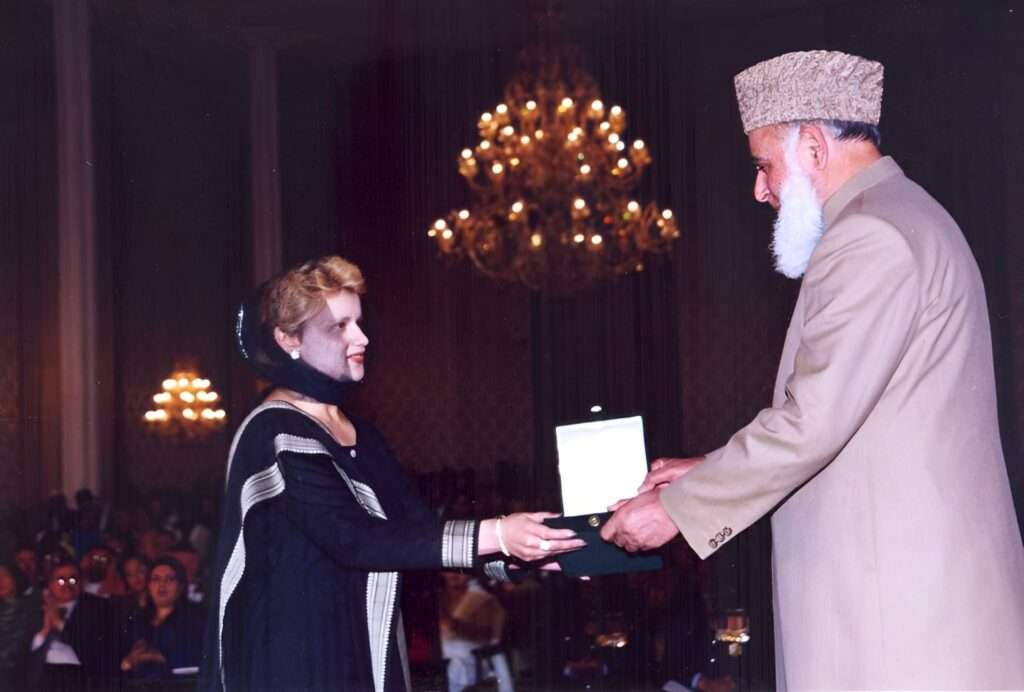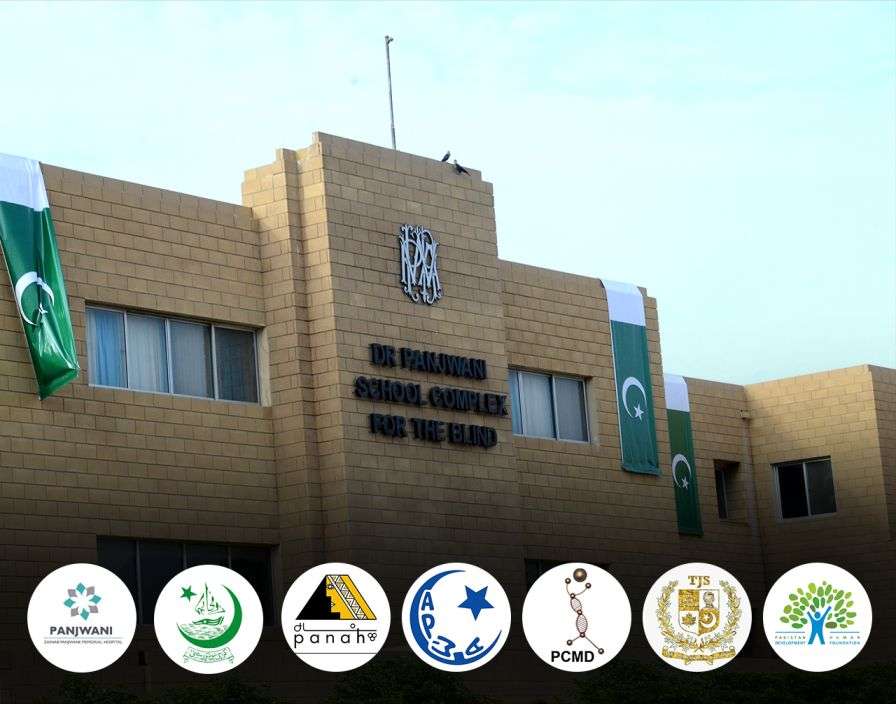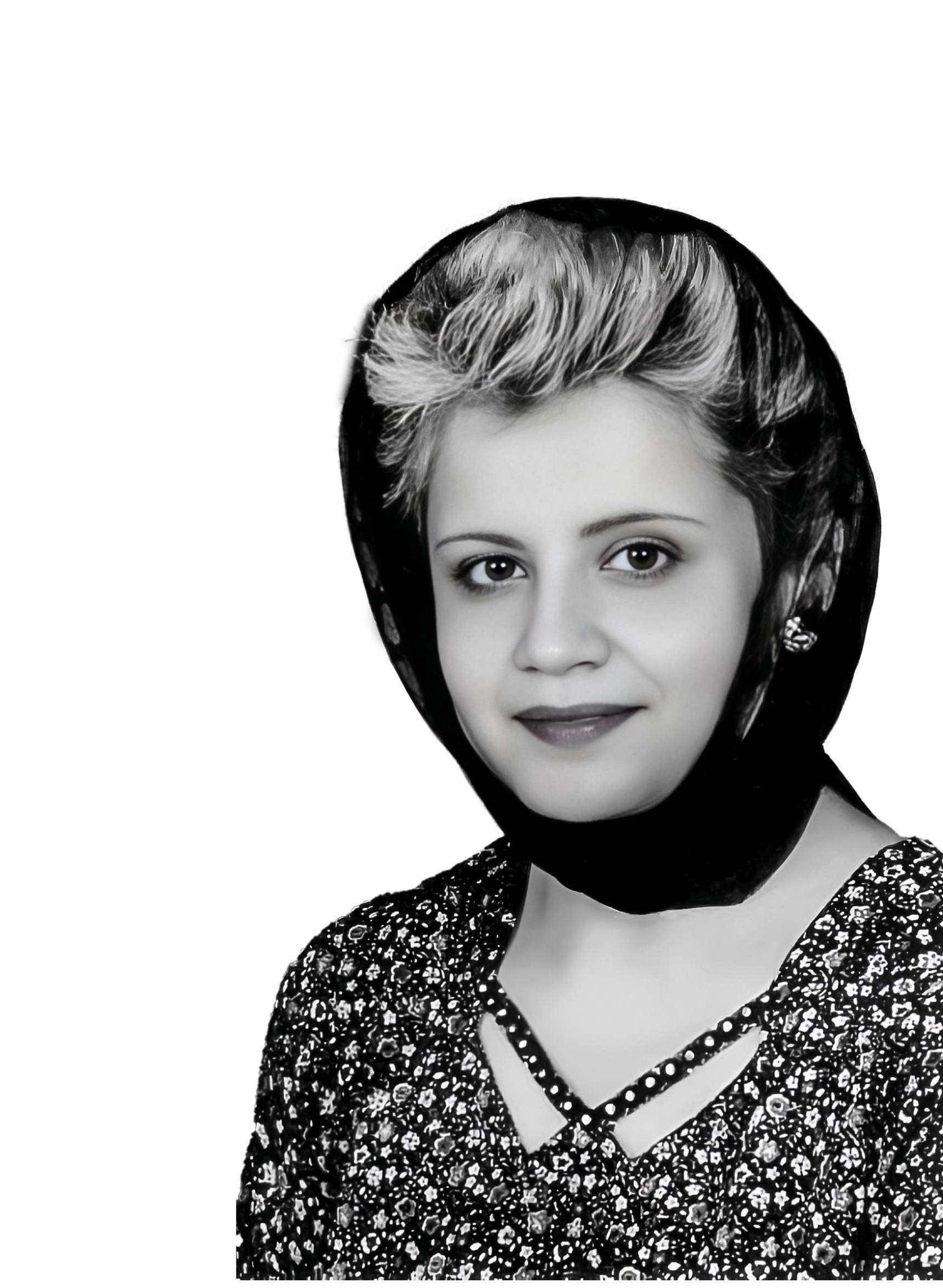We recently received news that KCFR (Karachi Council on Foreign Relations) was going to be chaired by a lady, Nadira Panjwani. Although, the first in the history of KCFR, this is not the first for Madam Panjwani to sit as the Head of a board of governance. This Chairwoman needs no introduction; I believe Madam Nadira demands the awe and respect that is exuded by her persona. The recipient of the Hilal-i-Imtiaz as well as the Sitara-i-Imtiaz, Ms. Panjwani is a well-known social worker. She is also the Founder and Managing Trustee of the Panjwani Charitable Foundation and Trusts, which were a legacy carried forward in her parents’ name.
In 2013 she was chosen as the recipient of the Benazir Bhutto Women Excellence Award by the Government of Sindh.
Her current project is the establishment of a Water Research Centre at the NED University of Science & Technology.
She has also been featured in a book by a famous German political analyst Kerstin Plehwe, titled ‘Die Macht der Frauen.’ She was honored as an outstanding Female Leader at the Female Leadership summit held in Berlin in September 2011.
Q. What was your first position as Chair of a Board?
The first position of Chair that I served in was that of the Panjwani Charitable Foundation, a family foundation established by my father. After his demise, naturally I had to carry on his work and mission. He was totally committed to the promotion of Human Development in Pakistan and his areas of interest were education, health and women empowerment, these are essentially the foundations of development for any country.
Q. The Passion for Social Work and Welfare
The guidelines were set by my father. He was a learned person with a Phd in Development Economics. He believed in the ideology of Pakistan and felt that everybody should play their role in taking the country forward. He insisted that I go for higher education and played an active role in shaping my value system. I was inducted as a member of his board of trustees at an early age, and later after my father’s demise I led the foundation.
My father was my inspiration and role model, every moment I spent in his company was an education for me. He was so knowledgeable about everything – he was my ‘Encyclopedia’.
Q. Thoughts on Pakistan
It’s a matter of great regret to see a country with so much promise and potential turn into a land of shattered dreams.
Decades upon decades of poor leadership, systemic failures, vacuum of governance, overpopulation, illiteracy and poverty have driven us to the brink of total collapse, and we have no one to blame except ourselves. If we have failed so miserably in having the right leaders, it is a reflection on our national characteristics.
Q. Women’s Role in Decision Making Positions
Yes, women empowerment is most essential in all spheres of public life. Women generally comprise 50% of any population and if such a huge segment of society is disenfranchised than that is a recipe for disaster.
Q. Educational Reforms
Our current system of education is simply pathetic. We have multiple systems – Madrassahs, Government schools, Elite and private ones. This is producing a highly fractured and disjointed society.
We need a uniform education system in the country and there is no rocket science to it. All developing countries have done it and we can easily follow their models with the required modifications.
Pakistan is the 5th most populous nation in the world with 1/3rd of her people under the age of 15. We have approximately 25 million out of school children and our GDP expenditure (approximately under 3%) on education is one of the lowest in this region.
Extremist ideology and dogma must be totally erased from our curricula and replaced with values of peace, tolerance and cooperation. We must encourage critical thinking, debate, reasoning and questioning in our classrooms.

Q. Your hand in politics, what was the experience like?
I would like to say that I served as a Caretaker Minister for Women Development and Population Planning in the 2007-2008 caretaker cabinet of Sindh. This is an apolitical and neutral position. I accepted the position as it was service to the country. It turned out to be a great learning experience for me as I got to observe how the government machinery runs and see for myself that it is a highly regulated process.
There are public misconceptions about endemic lethargy and corruption in the government but this is not always true. I had to steer two departments, Women Development and Population Planning and luckily got to work closely with fine people who were dedicated and eager to deliver.
For me the greatest attraction of being in government was that it is an enabling position where you can do a lot of good if you want to. Through positive interventions and policies, you can help your people in a major way.
Now in private philanthropy and social work, there are limitations in terms of resources and scale, but Governments have the scale and the required resources.
Q. Tell us about the Karachi Council on Foreign Relations?
KCFR was established in 2003 by a group of eminent civic leaders. These were mostly retired jurists, service men, diplomats and businessmen. The charter of KCFR is wide ranging with many objectives. So far it has been playing the role of a facilitator for promoting diplomatic relations, engaging with envoys posted here or visiting foreign delegations. We do this through hosting interactive meetings and talk sessions. What is lacking is a follow up mechanism. I would like to establish this so that useful leads for bilateral cooperation in all areas of our national interest could be further explored and operationalized.
Q. How would you like to take KCFR forward?
Recently through the personal efforts of our previous governance, we have engaged with the Investment Department, Government of Sindh. KCFR will facilitate linkage with foreign trading bodies, and this could lead to mutually beneficial out-comes. If our partnership with the Government of Sindh is successful, we may scale it up and replicate the same with other provinces. I believe that trade is a disincentive to hostility and conflict, and it paves the way for peace and collaboration.
So KCFR must proactively try to augment government efforts for developing more and more beneficial trade links with foreign countries for Pakistan.
Q. Vision for KCFR
KCFR is a nonpartisan body with no political affiliation. We are an independent body working for national interests only. We need both federal and provincial support to help us carry our agenda forward, so I would like to see greater partnership between KCFR and our government working synergistically for our national interests.
I would also like us to focus on producing quality publications which could provide insight and guidelines based on solid research and evidence to our decision makers on all subjects that have a bearing on Pakistan, be it interstate relations, changing world dynamics, onslaught of modern technology, climate change and so on. To this end we must gather a team of qualified researchers and scholars who could produce quality papers providing evidence-based input to our policy makers.
I think we must closely study the workings of internationally successful think tanks and try to model ourselves accordingly.
KCFR Diplomacy & Culture
Our engagement with foreign envoys and delegations is at a satisfactory level, now we must try to establish the cultural diplomacy component of our program. This may lead to useful collaboration in all spheres of culture and education like student exchange programs and scholarships for our students abroad. We have a number of MOUs with foreign universities and these need to be activated.
Q. A Message for Pakistan
This is a time of unprecedented depression and despair for all of us, but we must stay the course. If we are sincere in our efforts, then the tide will turn. There will be no miracles and there will be no Messiahs. The only way to get out of this quagmire is through hard work. Change will come only if we change ourselves.
As the famous American sociologist, Margaret Meade once said, “Never doubt that a small group of thoughtful, committed citizens can change the world, indeed, it’s the only thing that ever has”.
To our young people I would like to say, “There is no elevator to success. You have to take the stairs”.

Q. The Many fields of Nadira Panjwani’s Social Work
The Zainab Panjwani Memorial Hospital: In 1994, she established the Zainab Panjwani Memorial Hospital. This 100-bed, not-for-profit organization provides quality medical care at subsidized rates and also on free basis to all members of the public. This health facility is dedicated to the memory of her late mother. Attached to it is the Zainab Panjwani School of Midwifery providing free of cost training to young women seeking a career in paramedical services.
Ida Rieu: In the year 2000 she established the Dr. Panjwani School-College for the Blind.
This facility is affiliated with the University of Karachi and is the largest academic centre for visually handicapped people in Pakistan. It is functioning under the management of the Ida Rieu Welfare Association (IRWA), Karachi. She is the President of Ida Rieu and the chairperson of its Academic Council.
PANAH Shelter Home for Women: Managing Trustee of PANAH Trust.
The Jinnah Society: Member of the Jinnah Society which assists in the development of projects dedicated to the memory of Muhammad Ali Jinnah for the propagation of his principles and vision.
University of Karachi: Member of Executive Board of the International Centre for Chemical & Biological Sciences, University of Karachi.
Dr. Panjwani Centre for Molecular Medicine and Drug Research at the University of Karachi: This is the first Centre of its kind in Pakistan conducting research in the field of molecular medicine and drug development.
All Pakistan Women’s Association (APWA): Chairperson Education (2009- 2012)
Pakistan Human Development Fund: Previously served as Chairperson and is a Founding member of PHDF.
Educational Boards of Governance: She has served on the Board of Governors of the Federal Higher Education Commission of Pakistan, Syndicate of the Dow University of Health Sciences, Board of Governors of the National University of Modern Languages, Syndicate and Senate of the NED University, and Board of Governors of the Bahria University and numerous other academic and health bodies.





